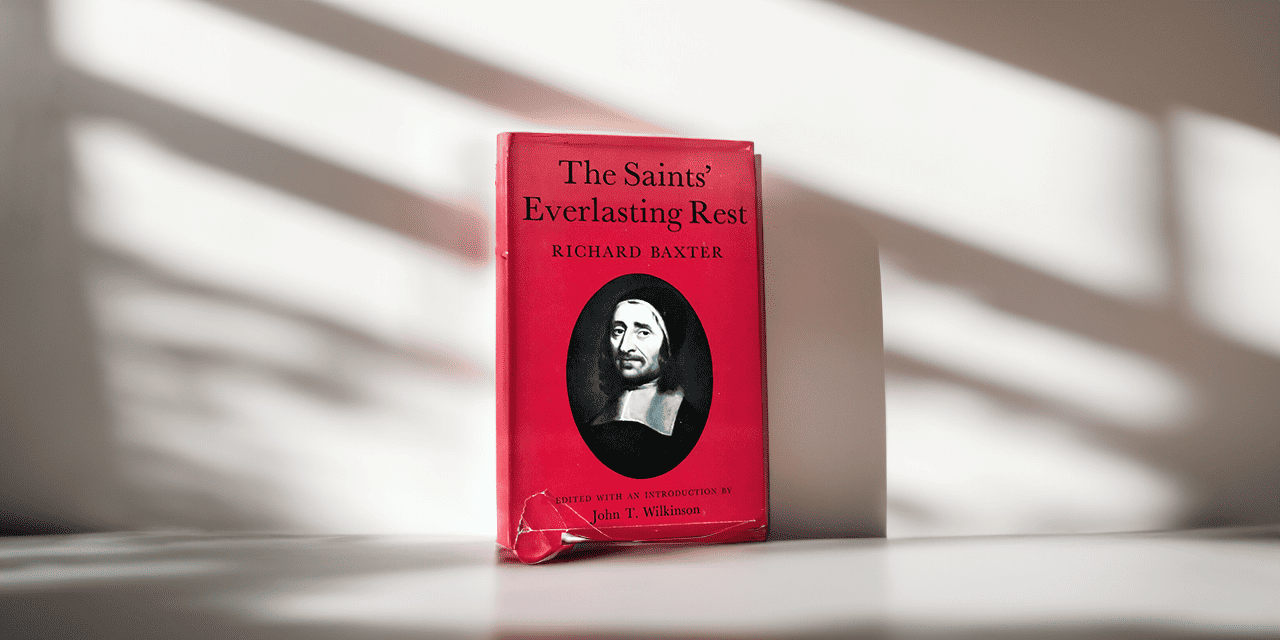Title: The Saint’s Everlasting Rest (Updated and Abridged)
Author: Richard Baxter
Publisher and Year: Epsworth Press, 1964
ISBN: 9781433578878
The name Richard Baxter was not a name I was familiar with before reading this book. I’ve had the book on my bookshelf for a number of years but, because it doesn’t have a cover jacket and the name on the spine had worn away, it just wasn’t a book I placed any priority on. So, it sat there on the shelf, waiting patiently for divine providence to intercede! Then, recently, I finished a couple of books and my hand grabbed a certain ignored book from the shelf.
My initial thoughts about The Saints’ Everlasting Rest, were that it was a book about dying from a Christian’s perspective and that it was a book about encouragement for those Christians wanting to know how to die well. That’s not strictly how it was put to me but that’s how I interpreted its meaning. I remember being slightly curious about what an old Puritan might have to say about preparing to die but it seemed to be, for me as a young(ish) Christian man, a book that should be put on the “no rush” list. Oh man was I ever wrong. I mean, if I didn’t believe in divine providence, I would have said “I wish I’d read this book the day I became a Christian”!
I “discovered” the writings and works of the Puritans nearly a decade ago. I’ve since been reading and loving writers such as Owen, Sibbes, Flavel, Charnock, Baxter, Bunyan, Gurnall and others. I’m not a person who finds it easy reading some of these “big guns”, but perseverance has reaped an abundance of spiritual treasure. Yet, I wasn’t prepared for the impact The Saints’ Everlasting Rest would have upon me. Even as I write these words I’m sensitive to the fact that people may find my words too emotive, or perhaps feel that I am overstating its significance but can I just say this: I LOVED READING THIS BOOK!
The book begins with an introductory essay that is 22 pages long and gives the reader a good understanding of what was happening for Baxter before, during and after he wrote this book. Interestingly, Richard Baxter was influenced greatly by Richard Sibbes in his salvation. Baxter wrote that “Sibbes opened more the love of God to me and gave me a livelier apprehension of the mystery of redemption and how much I was beholden to Jesus Christ”.
This edition being reviewed is The Epworth Press 1962 copy, with a foreword by John T. Wilkinson. As I began reading this book I was somewhat reading it half-heartedly. I was appreciating some of the earnestness with which Baxter wrote regarding the topic of looking to heaven and looking forward to heaven but it was written by a man dying and I certainly wasn’t dying and I wasn’t old! Baxter was in fact very ill when he wrote the book. The first edition of his book was somewhat written hastily, with a view to encourage his church family before he could succumb to his illness. Baxter served as an army chaplain during some horrific wars and in 1647, his prolonged illnesses meant he had to leave the army and soon after he began writing this book. Baxter was later quoted as saying he wrote it as a labour of love while “looking death full in the face and yet experiencing the sufficient grace of God”. So of course, a dying man would want to write something to encourage Christians in regards to their looking forward to heaven.
But first things first, it wasn’t until I reached page 132 that my eyes began to open a little wider. Up until that point I was reading about some of the wonders of heaven and why we should look forward to it; things such as the fact that Jesus will be there (and this has excited me for longer than I can remember) and that our Christian brothers and sisters will be there. In addition, it is a place where there’s no pain, there’s no suffering, and other sweet excellencies of heaven! But, I hadn’t yet had that kaboom moment. In my own copy, at the top of chapter 15, titled “Some General Helps to a Heavenly Life,” I have written in large letters APPLICATION and MEDITATION. By the time I read from pages 132 to page 184, I knew that I had to go back to the beginning and re-read this book but this time more intentionally.
Looking back, I realise that the opening sentence of chapter 15 “blew my hair back,” so to speak. Baxter writes “know heaven to be the only treasure and labour to know also what a treasure it is” (emphasis added). I was struck at the forcefulness of the words here. The second sentence had my complete attention when Baxter continues “be convinced once that thou hast no other happiness, and then be convinced what happiness is there”. I mean who doesn’t want to be happy? I just never really thought enough about how much we should be looking forward to heaven. I could say so much more about why we should indeed think more about where we will spend eternity but then you won’t need to read the book.
Now, before I move onto another significant moment for me in the reading of this book, let me just give a few headlines that Baxter discusses further in chapter 15: “Labour to know heaven to be the ONLY happiness; labour to apprehend how near it [heaven] is; be much in serious discoursing of it; make it thy business in EVERY DUTY to wind up thy affections nearer heaven; all providences and creatures [anything created] are means to our rest.”
If chapter 15 opened my eyes a little wider, then chapter 16 nearly popped my eyes from their sockets. As I read the first paragraph I knew without a doubt that this book was going to be a tool for the increase of my sanctification. Baxter reminds and encourages us that “practice is the end of all sound doctrine”! The next sentence had me questioning why I hadn’t previously thought much about this topic until now. Baxter writes “the duty which I press upon thee so earnestly, I shall now describe and open to thee; for I suppose thou art ready to enquire, ‘What is this so highly extolled work?’ It is the set and solemn acting of all the powers of the soul upon this most perfect object, rest, by meditation”. I have read and heard from so many trusted Christian sources of the value and the need for Christian meditation in our lives. I’ve even considered “giving it a crack myself” over the years. But I never “found” the time or figured it was for “super spiritual” Christians only. Baxter seemed to know all of the excuses I have used, and will in the future, to resist meditating. Baxter warns that we should “be exceedingly watchful” in managing our hearts. Baxter warns that “whenever you set upon this heavenly employment you shall find your own hearts your greatest hinderer”. But he offers the reader many great and helpful tools to overcome all the “excuses” your very self will find to avoid meditation. Baxter says that when it comes to dealing with our easily distracted heart, we indeed will often have to “command thy heart; if it rebel, use violence with it. If thou be too weak, call in the Spirit of Christ to thine assistance”. The heart will try and be diverted from meditating and will be trying to turn you “aside like a careless servant to talk with every one that passeth by . . . it will be thinking of thy calling, or thinking of thine afflictions, or of every bird, or tree, or place thou seest, or of any impertinency, rather than of heaven” (p. 176).
So, I determined how I could learn to be more intentional about meditating. I wanted to know how I could do that. Not for my own glory, but for the glory of my glorious Saviour Jesus! I wanted to know how I could love Him more, know Him more, serve Him more. I was officially excited and I subsequently read the remainder of the book, and with pen in hand, I found that I was scribbling everywhere and underlining everything. And so, like a man who had been given a treasure map halfway through a journey, I returned to the beginning of the book and started the journey again with renewed vigour and enthusiasm. I hope even a portion of my enjoyment of this book has encouraged you to get alongside Richard Baxter’s brilliant book, The Saints’ Everlasting Rest . . . for His glory!


